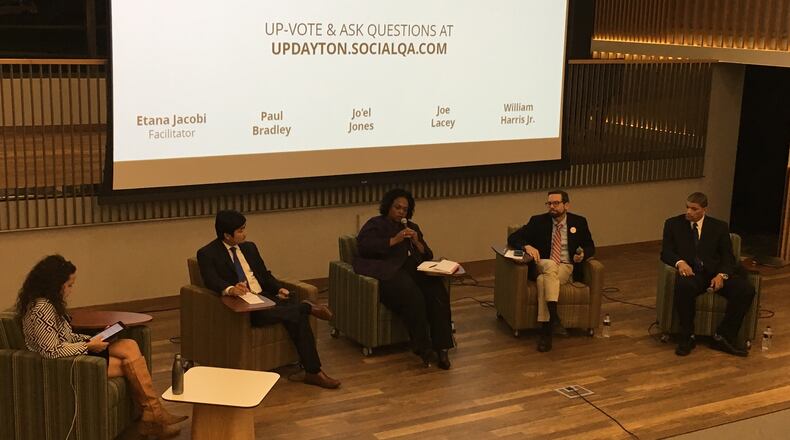VOTERS GUIDE: See the candidates’ answers on key questions
There was energetic debate, but none of the fireworks that have characterized some Dayton school board meetings, as several candidates mentioned a need for more professionalism on the board.
Rhynard and Al-Hamdani sparred early on about the tone of the district, as it fights flight to the suburbs. Rhynard expressed optimism about the impact of a new teacher coaching program and recent third-grade reading gains, saying “there are some amazing things going on in Dayton Public Schools.” Al-Hamdani disagreed, pointing to the second-lowest performance index in the state, plus a drop in student growth scores.
“That’s because they take their eyes off the ball all the time,” he said.
RELATED: DPS lowers GPA floor for sports, adds tutoring
Jones pointedly questioned Harris, after he mentioned that his four-candidate “slate” (Harris, Bradley, Wick-Gagnet and Al-Hamdani) was working on a 10-year plan or vision for the district. She asked how they could do that without broad input from the community and other board members, and criticized the group for not attending school board meetings.
Harris responded only that, “It’s called vision,” and Bradley later said the plan would not be created “in isolation,” but in concert with business and community leaders who had endorsed the four.
Gallin, a former school board member and current tutor, displayed knowledge of current DPS issues, from specifics of the district’s contracts with mental health providers, to staffing and leadership of English as a Second Language programs, as well as budget and salary issues.
RELATED: Summit aims to boost education for black male students
Lacey made a stand on his independence, pointing out multiple times when he was the only school board member to buck the consensus. He was the only vote against the new 1.0 GPA athletic eligibility policy, against extending Athletic Director Mark Baker’s contract and against moving to a middle school model last year, which caused many students and staff to switch schools.
Wick-Gagnet repeatedly pointed to better relationship-building as a key to success for Dayton schools. She said better relationships with teachers, business and community leaders would prevent the district from missing opportunities, calling the current setup “a house divided.”
Asked whether they would push to put a levy on the ballot, Lacey and Jones said yes, while Al-Hamdani and Wick-Gagnet said only if it was specific to bolstering teacher pay. Bradley said yes, if community partners were also on board. Rhynard was more noncommittal, while Gallin said it would be her last option. Harris said the district needs to demonstrate some success first, saying he doesn’t think the community would support a levy today.
RELATED: How did your schools do on the state report card?
Candidates suggested DPS needs more staffing in several areas, but moderator Etana Jacobi made them choose their top priority among three categories — more school counselors, library media specialists or English as a Second Language teachers (ESL).
Gallin, Al-Hamdani, Harris and Rhynard all picked ESL teachers. Jones said counselors, Bradley said librarians, and Wick-Gagnet said she couldn’t choose one because they were all important. Lacey said if he had to choose one, it would be counselors, but he said that would likely require cuts elsewhere, and he wouldn’t cut certified teachers to hire any of the three.
There was debate over whether to cluster all ESL students together, with Al-Hamdani saying that worked when he went through DPS, and Wick-Gagnet agreeing the district should look at that. Gallin and Rhynard disagreed, with Rhynard cautioning against the creation of a system seen as “separate but equal.”
About the Author

